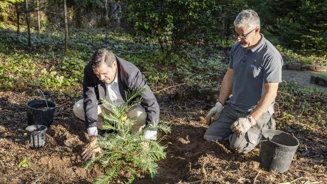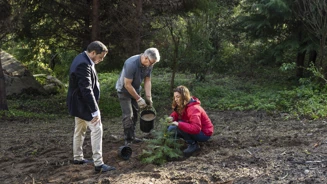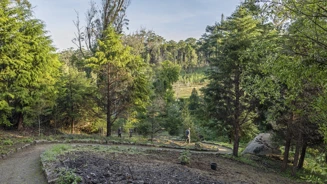The Park of Pena joins an international project to save a tree from the age of the dinosaurs from extinction
21 Nov 2023
Since 17 November, the Park of Pena's extensive botanical collection has featured a new source of interest. The most important arboretum in Portugal was the only such garden in Portugal chosen to be part of the international conservation project "Global Wollemia nobilis (Wollemi Pine) metacollection pilot program", receiving 6 specimens from the metacollection of Wollemia nobilis, a very rare tree dating from the age of the dinosaurs.
The "Global Wollemia nobilis (Wollemi Pine) metacollection pilot program" project, led by Denise Ora, Chief Executive of the Sydney Botanic Garden in Australia, aims to save the botanical species Wollemia nobilis, a conifer from the Araucariaceae family, from extinction. The oldest fossils of this tree are 200 million years old and the species was formerly thought to have gone extinct some 70 to 90 million years ago. However, in 1994, a young Australian explorer named David Noble discovered it by chance in a restricted region of temperate forest located in a gorge in Wollemi National Park, 150 kilometres from the city of Sydney. The scientific name of the genus, Wollemia, derives from the name of the park where the trees were identified, and the species name, nobilis, honours the explorer who discovered it.
There are currently around 100 specimens of Wollemia nobilis in the wild, meaning the species is classified as critically endangered on the IUCN (International Union for the Conservation of Nature) Red List. For this reason, the tree has been the subject of significant conservation projects since its discovery, developed by the Australian Institute of Botanical Sciences at the Sydney Botanic Gardens with the aim of preventing its extinction.
It is in this context that the "Global Wollemia nobilis (Wollemi Pine) metacollection pilot program" project arose. After an in-depth genetic study, the Australian researchers produced a set of specimens in the laboratory that represent the entire genetic heritage found in the wild population of the species. For their subsequent planting, they selected locations around the world with climatic and conservation conditions that best guarantee the trees' survival. In Portugal, the Park of Pena was the only place chosen to receive six specimens of Wollemia nobilis, which, after arriving from Australia, were acclimatised in the Greenhouses of the Park of Pena until they were planted in the grounds of the Chalet of the Countess of Edla, which took place on 17 November.
Luís Calaim, director of Parques de Sintra, took part in the transplanting of the Wollemia nobilis specimens and emphasised: "For Parques de Sintra it is an honour and a privilege to take part in this international project to conserve such a rare and endangered botanical species, which is also a recognition of the quality of our work in this area. Preserving biodiversity is one the principal aspects of our mission, so it is with great commitment that we embrace the responsibility of helping to prevent the extinction of this species, in collaboration with other renowned international institutions."
The Park of Pena is now part of a small group of 34 international botanical gardens that will jointly create this metacollection, a botanical collection shared by various organisations and managed in collaboration with the aim of researching and conserving the species. The project involves 28 European botanical gardens, 5 in Australia, and 1 in North America. Growing these trees in different parts of the world will help preserve the wide genetic diversity found in the wild population and aims to save Wollemia nobilis from extinction.



